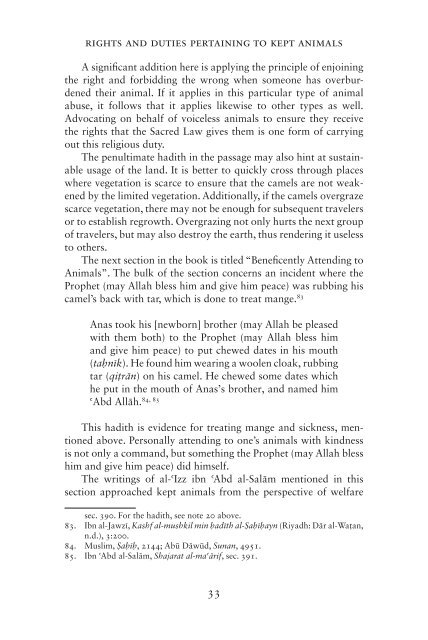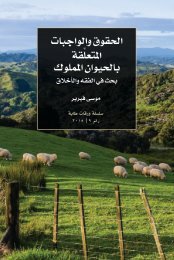Rights and Duties Pertaining to Kept Animals
1RcDQG8
1RcDQG8
Create successful ePaper yourself
Turn your PDF publications into a flip-book with our unique Google optimized e-Paper software.
<strong>Rights</strong> <strong>and</strong> duties pertaining <strong>to</strong> kept animals<br />
A significant addition here is applying the principle of enjoining<br />
the right <strong>and</strong> forbidding the wrong when someone has overburdened<br />
their animal. If it applies in this particular type of animal<br />
abuse, it follows that it applies likewise <strong>to</strong> other types as well.<br />
Advocating on behalf of voiceless animals <strong>to</strong> ensure they receive<br />
the rights that the Sacred Law gives them is one form of carrying<br />
out this religious duty.<br />
The penultimate hadith in the passage may also hint at sustainable<br />
usage of the l<strong>and</strong>. It is better <strong>to</strong> quickly cross through places<br />
where vegetation is scarce <strong>to</strong> ensure that the camels are not weakened<br />
by the limited vegetation. Additionally, if the camels overgraze<br />
scarce vegetation, there may not be enough for subsequent travelers<br />
or <strong>to</strong> establish regrowth. Overgrazing not only hurts the next group<br />
of travelers, but may also destroy the earth, thus rendering it useless<br />
<strong>to</strong> others.<br />
The next section in the book is titled “Beneficently Attending <strong>to</strong><br />
<strong>Animals</strong>”. The bulk of the section concerns an incident where the<br />
Prophet (may Allah bless him <strong>and</strong> give him peace) was rubbing his<br />
camel’s back with tar, which is done <strong>to</strong> treat mange. 83<br />
Anas <strong>to</strong>ok his [newborn] brother (may Allah be pleased<br />
with them both) <strong>to</strong> the Prophet (may Allah bless him<br />
<strong>and</strong> give him peace) <strong>to</strong> put chewed dates in his mouth<br />
(taḥnīk). He found him wearing a woolen cloak, rubbing<br />
tar (qiṭrān) on his camel. He chewed some dates which<br />
he put in the mouth of Anas’s brother, <strong>and</strong> named him<br />
84, 85<br />
ʿAbd Allāh.<br />
This hadith is evidence for treating mange <strong>and</strong> sickness, mentioned<br />
above. Personally attending <strong>to</strong> one’s animals with kindness<br />
is not only a comm<strong>and</strong>, but something the Prophet (may Allah bless<br />
him <strong>and</strong> give him peace) did himself.<br />
The writings of al-ʿIzz ibn ʿAbd al-Salām mentioned in this<br />
section approached kept animals from the perspective of welfare<br />
sec. 390. For the hadith, see note 20 above.<br />
83. Ibn al-Jawzī, Kashf al-mushkil min ḥadīth al-Ṣaḥīḥayn (Riyadh: Dār al-Waṭan,<br />
n.d.), 3:200.<br />
84. Muslim, Ṣaḥīḥ, 2144; Abū Dāwūd, Sunan, 4951.<br />
85. Ibn ʿAbd al-Salām, Shajarat al-maʿārif, sec. 391.<br />
33



